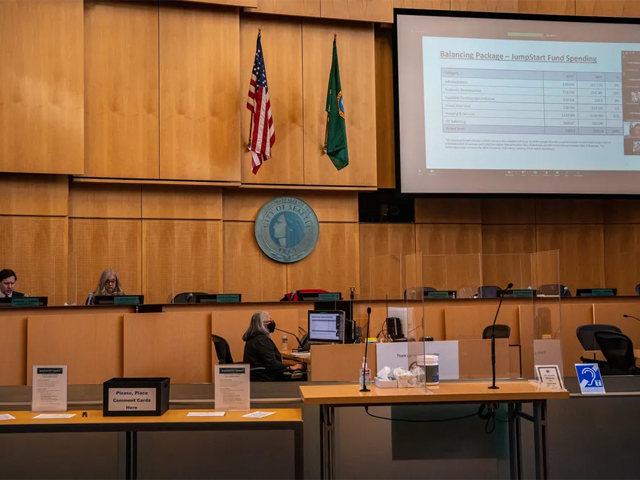News
The Seattle Times: Seattle, you have a spending problem
Posted on

This op-ed by DSA President & CEO Jon Scholes and Seattle Metropolitan Chamber of Commerce President & CEO Rachel Smith was originally published in The Seattle Times on Sept. 24 2023
By Rachel Smith and Jon Scholes
Special to The Seattle Times
You may have heard some alarming news about the city’s budget situation.
You may have heard the city is facing deficits, spending cliffs, inflation and austerity. You may have heard the city needs more taxes to fund critical programs and services.
But what if we told you the facts tell a different story?
The facts contain big numbers, numbers that can be hard to believe. But they are true, and what they tell you is the city has a spending problem, not a revenue problem.
We follow the city’s budget closely, and after analyzing the numbers, and data taken directly from the city’s own Revenue Stabilization Work Group, this is what we know: From 2017 through 2023, city general fund revenues increased 3.7% a year while city spending grew at a higher rate of 5.5%.
On top of that annual revenue growth, the city approved an additional $300 million in new annual taxes starting in 2021, according to the group.
Taken all together, since 2013 city tax collections have increased 94%, which is more than four times greater than population growth during that same period, states a report from ECONorthwest.
Even with all the new taxes and revenue growth, city spending has grown even faster, projected to leave the city with deficits of $221 million in 2025 and $207 million in 2026. (Seattle Revenue Stabilization Committee Report).
In a recent poll conducted by the Seattle Metro Chamber of Commerce, 65% of voters said they didn’t trust the city of Seattle to spend their tax dollars responsibly and 82% said they didn’t believe the city has an effective plan to address the critical issues facing Seattle. Voters are frustrated because despite years of growing revenue and City Council-passed new taxes and increased spending, not enough progress has been made on homelessness, fentanyl addiction, open dealing and drug use, and the mental health crisis playing out on our streets.
That is why we urge the city to take these three important steps before considering raising more taxes:
1. Get spending under control by reducing or eliminating services that do not meet measurable outcomes, are duplicative of other agencies or entities, are no longer aligned with people’s priorities, or have grown faster than real-world needs.
2. Prioritize existing revenues to meet the city’s highest priorities — especially public safety and drug use.
3. Increase the city’s tax base by making it easier to start or expand a business, allow more business uses in more places, cut red tape to increase housing supply and provide adequate public safety services to combat organized retail theft and violent behavior. All of these actions will strengthen and grow the overall tax base.
Let’s be blunt about it. We need to see that the council can invest resources in ways that get results before there is any discussion of new taxes. This fall, when the city budget process begins, voters deserve a council that brings daylight, transparency and accountability to the process. Let’s have honest conversations about what is working and what isn’t, what’s important and what’s not, what’s showing promising results and what’s just not working. Let’s reject the status quo that isn’t delivering and together chart a new course predicated on getting results for Seattle residents, business owners and employees.